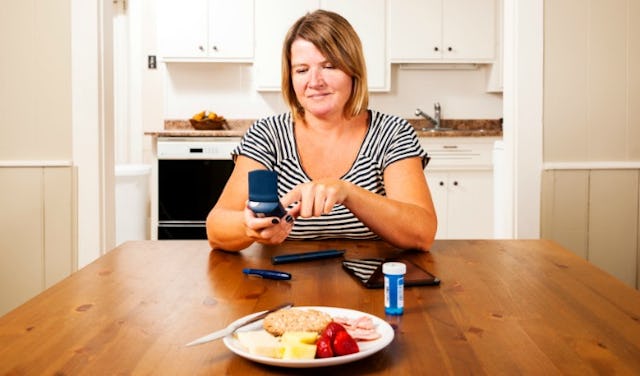Please Don’t Feel Sorry For Me Because Of My Disease

My disease has no cure. I’m responsible for checking my blood sugar several times a day, administering the correct dosage of insulin, and counting every gram of carbohydrate I eat.
Frankly, my disease is exhausting. If I’m not checking my blood sugar, I’m calling the insurance company to fight yet another sky-high medical bill. If I’m not injecting insulin to correct a high blood sugar, I’m questioning how hard and long I exercised that morning and what impact that will have on my disease later that day. If I’m not second-guessing how many carbohydrates are in the slice of pizza I just ate, I’m listening to another person ask me if I should even be eating that piece of pizza.
If I don’t keep my blood sugars under control, the long-term consequences might be blindness, amputation of feet or legs, kidney failure, certain cancers, heart issues, depression, sexual dysfunction, and a slew of other issues. It’s a lot to carry every day, knowing that every choice I make—from how much sleep I get, to what I eat, to when and how I exercise, to dosing insulin—is a point for life or death.
You wouldn’t know by looking at me that I have Type 1 diabetes. I look like most other moms: hair in a messy bun, yoga pants, and coffee in-hand. I wrangle my kids, cart them to their activities, and wipe their noses. I’m self-employed as a writer, and I spend my days juggling e-mails, sorting laundry, jotting down new ideas, and breaking up sibling arguments. My husband arrives home at 6 p.m., and then the bedtime dance we refer to as “hell time” begins. We collapse on the couch at 9:00, if we’re lucky, and watch mindless television. On the outside, I look pretty normal.
When people learn I have diabetes, either because they spot the insulin pump clipped to my pants or because they see me checking my blood sugar, I’m met with a slew of predictable questions and comments. I hear the horror stories of a great-uncle who had his leg amputated because he just couldn’t give up drinking soda. I’m asked if I can “just take pills.” Some tell me they could never, ever, ever fathom injecting themselves because needles are just so scary. Others question my dietary choices or assume I cannot ever consume sugar. I have well-meaning acquaintances who try to sell me special shakes and herbal supplements, or they message me an article about a promising-sounding “cure.” Some tell me all about their incredible chiropractor who can “heal” me. One person said, “At least it’s not cancer!” Some lean in and ask, in a whisper, “How are you?” and “Are your blood sugars under control?”
Keeping blood sugars under control is as easy as keeping a 2-year-old child from having a tantrum when you remove your iPhone from their hands. Because my pancreas has decided to cease producing insulin, the life-sustaining hormone, I have to do its job. This means I’m “on” 24/7/365.
The stress of a chronic disease is like nothing I’ve ever experienced. It means constant worrying, second-guessing, confusion, frustration and restlessness. What my disease has also produced is relentlessness, bravery, determination and prioritization. Balance takes on a whole new meaning when you’re someone fighting for your life every day.
As a diabetic, there are some things I really don’t need. I don’t want those “great-tasting, sugar-free, all-natural” strawberry powder drink mix-ins you’re selling for $12.99 a pop (heads up: they don’t cure me). I really don’t want to hear about your grandma who went blind or how ah-mazing your sister’s acupuncturist is. And please, please don’t lean in and whisper, “Are you OK?” These conversations do nothing but discourage me, remind me that I’m “sick” and my body is broken, and make me feel less-than.
Let me tell you what you can do. When I was in the hospital upon diagnosis, a friend came by. I was curled up in an uncomfortable bed, 30 pounds underweight, monitors hooked up to my body. My arms and hands were blue and green with bruising as a result of all the needle sticks. My feet felt like a thousand ants were marching inside of them, scratching to get out, a result of having too-high blood sugars for an extended period of time. I was miserable.
This friend did something so incredibly humbling. Instead of asking me how I was (it was obvious), instead of bringing me a cheery “Get Well Soon” card (since I wouldn’t ever “get well”), instead of asking me all about my new diagnosis, she sat at the end of my bed and rubbed my feet. Her message was clear: I care. I’m listening. I’m not giving to you in order to get something in return.
If you have a friend like me, someone living with a chronic disease, find a foot-rubbing act and just do it without expectation, without seeking personal gratification, without hesitation. Deliver that surprise cup of coffee on a dreary Wednesday. Mail a naughty greeting card that you know will make your friend smile on a hard day. Send a text that tells your friend how incredibly strong she is and how she’s a chronic disease bad ass. Ask, “What is one thing I can do to make your day better?” (and then do it).
Please don’t waste your energy feeling sorry for me. Stand up next to me, fight with me, and please, send me coffee.
This article was originally published on